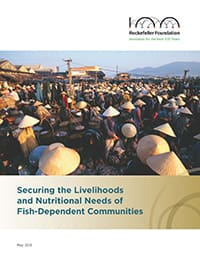Nearly a billion people worldwide depend on the oceans to meet their nutritional needs and sustain their livelihoods. The declining health of the oceans due to climate change, overfishing, pollution, and habitat destruction is a pressing problem for these populations. Starting in June 2012, the Rockefeller Foundation, with support from FSG, began investigating this plight to better understand the nature of the problem and the potential impact of interventions in the fields of fisheries, aquaculture, poverty alleviation, and food security.
Top Takeaways
- Several factors negatively impact fish-dependent communities, such as the degradation of the oceans, political marginalization, gender inequalities, limited access to markets, and weak institutions and infrastructure.
- When governments around the world abandon ineffective, top-down command and control approaches to resource management in favor of new shared fisheries governance systems, it increases the capacity of small-scale fishers to influence fisheries management decisions, improve compliance with management rules, and ultimately improve stock levels.
- There needs to be an alignment of conservation goals to protect the oceans with development objectives that ensure the well-being of the millions of people who depend on them.

